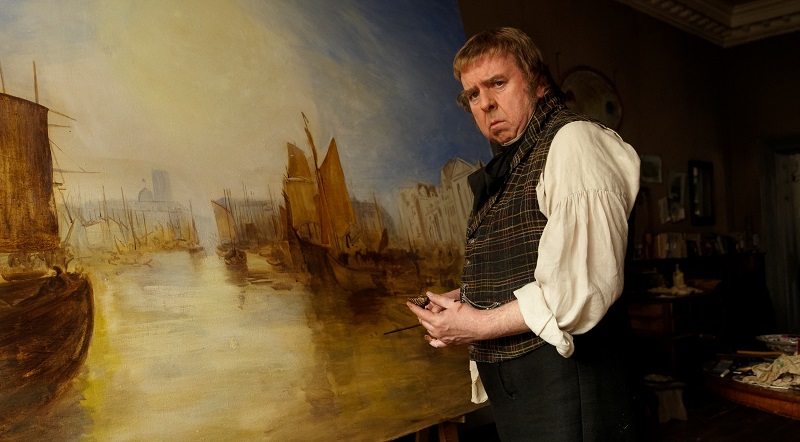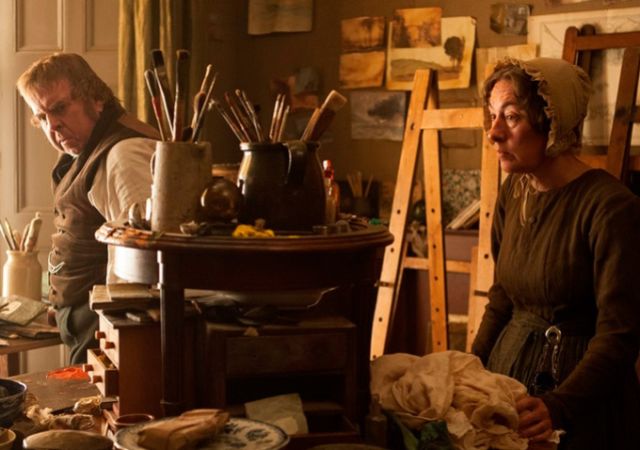Mr Turner | reviews, news & interviews
Mr Turner
Mr Turner
Mike Leigh does JMW Turner - and his own artistry - proud

There's been much talk about Late Turner, to co-opt the name of the exhibition now on view at Tate Britain covering the last 16 years in the English artist JMW Turner's singular career. And as if perfectly timed to chime with those canvases in celluloid terms is Mr Turner, the ravishing film that stands as a testimonial to what one might call Late Leigh. The writer-director Mike Leigh has made period pieces before, most notably Topsy-Turvy in 1999, but even by his own exalted standards this cinematic profile of one artist by another stands a league apart.
And just as Topsy-Turvy was as much a depiction of the man behind the camera as it was about Gilbert and Sullivan, so too does a palpable affinity for Leigh's current subject course through every frame of this Cannes prize-winning film. Leigh has never made any excuses either for himself or his pioneering approach to work, and so it is here with his take on a maverick painter whose aesthetic brilliance co-existed with a social brutishness that is neither condemned nor sanitised during the course of an utterly enveloping two and a half hours; it just is. To that extent, one may be struck by the noises that accompany Timothy Spall's performance as the Covent Garden barber's son (Paul Jesson is a winning presence as Turner père) who went on to shape the way we think about art: Spall spends much of the time grunting and snorting his way through the day, allowing his gathering proto-impressionism to speak more volubly than he himself chooses to do. But one is never in doubt about the visionary grace that seems to take Turner over once a sketchbook or paintbrush come into play. For all Leigh's long-proven mastery of language, Mr Turner reminds us time and again that there are other ways of connecting to the world. Or not, as the case may be.
To that extent, one may be struck by the noises that accompany Timothy Spall's performance as the Covent Garden barber's son (Paul Jesson is a winning presence as Turner père) who went on to shape the way we think about art: Spall spends much of the time grunting and snorting his way through the day, allowing his gathering proto-impressionism to speak more volubly than he himself chooses to do. But one is never in doubt about the visionary grace that seems to take Turner over once a sketchbook or paintbrush come into play. For all Leigh's long-proven mastery of language, Mr Turner reminds us time and again that there are other ways of connecting to the world. Or not, as the case may be.
Indeed, this is hardly the first portrait of an artist as a dysfunctional family man - a jettisoned mistress (Ruth Sheen, another Leigh veteran) pitches up with her brood in tow. Alas, Turner's affections by that point have long since been given over first to an abject-seeming housekeeper (a rivetingly indrawn Dorothy Atkinson, pictured below with Spall) and ultimately to the widowed landlady, Sophia, who takes Turner in, this kind-hearted woman responding first to the man and only secondarily to the celebrated artist with whom she discovers she is sharing a house and then a bed. An open-faced Marion Bailey (Leigh's real-life partner) is a quiet sensation in this part, and one hopes amid all the deserved clamour afforded Spall, Leigh and inimitable cameraman Dick Pope that Bailey gets her due when prizes are doled out.
 The film places Turner in the social whirl of the age - his presence among the Royal Academy's politicking artistic fraternity is vividly caught - and in bustling, beady-eyed contemplation of nature, scene after scene subordinating the artist in pictorial terms to the vistas in front of him, or else capturing in filmic terms something of the heady investigation into the qualities of light that illuminate Turner's renown to this day. The film avoids the glib shorthand that often attends such ventures, and such connections as are made between his daily routine and his output go commendably unforced. There's a lovely sequence in which Turner absorbs a reminiscence from Sophia's then-living husband, Mr Booth (Karl Johnson), about his time aboard slave ships - from which encounter Turner's maritime classic T" (1840) was born.
The film places Turner in the social whirl of the age - his presence among the Royal Academy's politicking artistic fraternity is vividly caught - and in bustling, beady-eyed contemplation of nature, scene after scene subordinating the artist in pictorial terms to the vistas in front of him, or else capturing in filmic terms something of the heady investigation into the qualities of light that illuminate Turner's renown to this day. The film avoids the glib shorthand that often attends such ventures, and such connections as are made between his daily routine and his output go commendably unforced. There's a lovely sequence in which Turner absorbs a reminiscence from Sophia's then-living husband, Mr Booth (Karl Johnson), about his time aboard slave ships - from which encounter Turner's maritime classic T" (1840) was born.
But exhilaratingly crisp though the film's look is, it never stoops to the merely pictorial, as if that choice would draw attention away from the inner drive and vigour that propel Turner ever onwards. Spall maps out each new chapter in the painter's art and life like some unsung pugilist forever trying to wrestle what he sees around him into an image that can be contained. And the fact that the painter is rarely if ever heard explaining either himself or his techniques seems in every way right. He's found a corresponding visionary in Leigh for whom empathy is the most majestic explanation there is.
View the trailer for Mr Turner overleaf
There's been much talk about Late Turner, to co-opt the name of the exhibition now on view at Tate Britain covering the last 16 years in the English artist JMW Turner's singular career. And as if perfectly timed to chime with those canvases in celluloid terms is Mr Turner, the ravishing film that stands as a testimonial to what one might call Late Leigh. The writer-director Mike Leigh has made period pieces before, most notably Topsy-Turvy in 1999, but even by his own exalted standards this cinematic profile of one artist by another stands a league apart.
And just as Topsy-Turvy was as much a depiction of the man behind the camera as it was about Gilbert and Sullivan, so too does a palpable affinity for Leigh's current subject course through every frame of this Cannes prize-winning film. Leigh has never made any excuses either for himself or his pioneering approach to work, and so it is here with his take on a maverick painter whose aesthetic brilliance co-existed with a social brutishness that is neither condemned nor sanitised during the course of an utterly enveloping two and a half hours; it just is. To that extent, one may be struck by the noises that accompany Timothy Spall's performance as the Covent Garden barber's son (Paul Jesson is a winning presence as Turner père) who went on to shape the way we think about art: Spall spends much of the time grunting and snorting his way through the day, allowing his gathering proto-impressionism to speak more volubly than he himself chooses to do. But one is never in doubt about the visionary grace that seems to take Turner over once a sketchbook or paintbrush come into play. For all Leigh's long-proven mastery of language, Mr Turner reminds us time and again that there are other ways of connecting to the world. Or not, as the case may be.
To that extent, one may be struck by the noises that accompany Timothy Spall's performance as the Covent Garden barber's son (Paul Jesson is a winning presence as Turner père) who went on to shape the way we think about art: Spall spends much of the time grunting and snorting his way through the day, allowing his gathering proto-impressionism to speak more volubly than he himself chooses to do. But one is never in doubt about the visionary grace that seems to take Turner over once a sketchbook or paintbrush come into play. For all Leigh's long-proven mastery of language, Mr Turner reminds us time and again that there are other ways of connecting to the world. Or not, as the case may be.
Indeed, this is hardly the first portrait of an artist as a dysfunctional family man - a jettisoned mistress (Ruth Sheen, another Leigh veteran) pitches up with her brood in tow. Alas, Turner's affections by that point have long since been given over first to an abject-seeming housekeeper (a rivetingly indrawn Dorothy Atkinson, pictured below with Spall) and ultimately to the widowed landlady, Sophia, who takes Turner in, this kind-hearted woman responding first to the man and only secondarily to the celebrated artist with whom she discovers she is sharing a house and then a bed. An open-faced Marion Bailey (Leigh's real-life partner) is a quiet sensation in this part, and one hopes amid all the deserved clamour afforded Spall, Leigh and inimitable cameraman Dick Pope that Bailey gets her due when prizes are doled out.
 The film places Turner in the social whirl of the age - his presence among the Royal Academy's politicking artistic fraternity is vividly caught - and in bustling, beady-eyed contemplation of nature, scene after scene subordinating the artist in pictorial terms to the vistas in front of him, or else capturing in filmic terms something of the heady investigation into the qualities of light that illuminate Turner's renown to this day. The film avoids the glib shorthand that often attends such ventures, and such connections as are made between his daily routine and his output go commendably unforced. There's a lovely sequence in which Turner absorbs a reminiscence from Sophia's then-living husband, Mr Booth (Karl Johnson), about his time aboard slave ships - from which encounter Turner's maritime classic T" (1840) was born.
The film places Turner in the social whirl of the age - his presence among the Royal Academy's politicking artistic fraternity is vividly caught - and in bustling, beady-eyed contemplation of nature, scene after scene subordinating the artist in pictorial terms to the vistas in front of him, or else capturing in filmic terms something of the heady investigation into the qualities of light that illuminate Turner's renown to this day. The film avoids the glib shorthand that often attends such ventures, and such connections as are made between his daily routine and his output go commendably unforced. There's a lovely sequence in which Turner absorbs a reminiscence from Sophia's then-living husband, Mr Booth (Karl Johnson), about his time aboard slave ships - from which encounter Turner's maritime classic T" (1840) was born.
But exhilaratingly crisp though the film's look is, it never stoops to the merely pictorial, as if that choice would draw attention away from the inner drive and vigour that propel Turner ever onwards. Spall maps out each new chapter in the painter's art and life like some unsung pugilist forever trying to wrestle what he sees around him into an image that can be contained. And the fact that the painter is rarely if ever heard explaining either himself or his techniques seems in every way right. He's found a corresponding visionary in Leigh for whom empathy is the most majestic explanation there is.
View the trailer for Mr Turner overleaf
The future of Arts Journalism
You can stop theartsdesk.com closing!
We urgently need financing to survive. Our fundraising drive has thus far raised £49,000 but we need to reach £100,000 or we will be forced to close. Please contribute here: https://gofund.me/c3f6033d
And if you can forward this information to anyone who might assist, we’d be grateful.

Subscribe to theartsdesk.com
Thank you for continuing to read our work on theartsdesk.com. For unlimited access to every article in its entirety, including our archive of more than 15,000 pieces, we're asking for £5 per month or £40 per year. We feel it's a very good deal, and hope you do too.
To take a subscription now simply click here.
And if you're looking for that extra gift for a friend or family member, why not treat them to a theartsdesk.com gift subscription?
more Film
 Blu-ray: Finis Terrae
Bleak but compelling semi-documentary, filmed on location in Brittany
Blu-ray: Finis Terrae
Bleak but compelling semi-documentary, filmed on location in Brittany
 Oslo Stories Trilogy: Sex review - sexual identity slips, hurts and heals
A quietly visionary series concludes with two chimney sweeps' awkward sexual liberation
Oslo Stories Trilogy: Sex review - sexual identity slips, hurts and heals
A quietly visionary series concludes with two chimney sweeps' awkward sexual liberation
 Sorry, Baby review - the healing power of friendship in the aftermath of sexual assault
Eva Victor writes, directs and stars in their endearing debut feature
Sorry, Baby review - the healing power of friendship in the aftermath of sexual assault
Eva Victor writes, directs and stars in their endearing debut feature
 Blu-ray: Who Wants to Kill Jessie?
Fast-paced and visually inventive Czech comedy
Blu-ray: Who Wants to Kill Jessie?
Fast-paced and visually inventive Czech comedy
 Oslo Stories Trilogy: Love review - freed love
Gay cruising offers straight female lessons in a heady ode to urban connection
Oslo Stories Trilogy: Love review - freed love
Gay cruising offers straight female lessons in a heady ode to urban connection
 Beating Hearts review - kiss kiss, slam slam
Romance and clobberings in a so-so French melodrama
Beating Hearts review - kiss kiss, slam slam
Romance and clobberings in a so-so French melodrama
 Materialists review - a misfiring romcom or an undercooked satire?
Writer-director Celine Song's latest can't decide what kind of film it is
Materialists review - a misfiring romcom or an undercooked satire?
Writer-director Celine Song's latest can't decide what kind of film it is
 theartsdesk Q&A: actor Leonie Benesch on playing an overburdened nurse in the Swiss drama 'Late Shift'
The Guildhall-trained German star talks about the enormous pressures placed on nurses and her admiration for British films and TV
theartsdesk Q&A: actor Leonie Benesch on playing an overburdened nurse in the Swiss drama 'Late Shift'
The Guildhall-trained German star talks about the enormous pressures placed on nurses and her admiration for British films and TV
 Freakier Friday review - body-swapping gone ballistic
Lindsay Lohan and Jamie Lee Curtis's comedy sequel jumbles up more than their daughter-mother duo
Freakier Friday review - body-swapping gone ballistic
Lindsay Lohan and Jamie Lee Curtis's comedy sequel jumbles up more than their daughter-mother duo
 Eight Postcards from Utopia review - ads from the era when 1990s Romania embraced capitalism
Radu Jude's documentary is a mad montage of cheesy TV commercials
Eight Postcards from Utopia review - ads from the era when 1990s Romania embraced capitalism
Radu Jude's documentary is a mad montage of cheesy TV commercials
 The Kingdom review - coming of age as the body count rises
A teen belatedly bonds with her mysterious dad in an unflinching Corsican mob drama
The Kingdom review - coming of age as the body count rises
A teen belatedly bonds with her mysterious dad in an unflinching Corsican mob drama

Add comment